MercoPress. South Atlantic News Agency
Tag: cars sales
-
Monday, December 2nd 2024 - 09:01 UTC
Argentine carmakers lower price of brand-new models
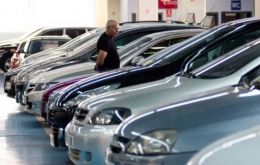
Argentine carmakers announced during the weekend that they would be lowering the retail prices of some of their brand-new models after the suppression of the so-called PAIS tax on transactions abroad, which applied to the import of vehicles and autoparts, it was explained. The measure is also a response to a significant plunge in sales.
-
Monday, July 8th 2019 - 20:21 UTC
Brazilian auto exports expected to plunge because of Argentina's recession
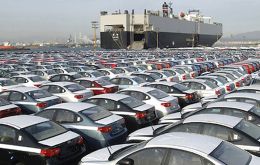
Brazilian vehicle exports to Argentina are expected to plunge this year, and the industry could face threats from rising imports following a free trade agreement between the European Union and Mercosur, a major industry body said.
-
Thursday, March 5th 2015 - 07:25 UTC
Car sales in Argentina plunge; worst February since 2009
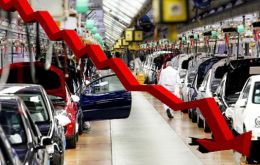
The second month of the year marked another negative result for auto sales in Argentina, which dropped 28% compared to February last year, showing how the sector’s downward trend appears to have no end in sight. Only 41,998 vehicles were sold last month, according to the ACARA Argentine car dealership association, the lowest figure for the month since 2009.
-
Saturday, May 24th 2014 - 00:27 UTC
Argentina's auto sales record last year was fed on 'steroids', claims Fiat CEO

One of Argentina's main industry leaders, Fiat CEO Cristiano Rattazzi. said that the boost of auto manufacturing during 2013 and record sales was fed on 'steroids' and demanded more reliability in the rules to revitalize sales.
-
Wednesday, January 8th 2014 - 05:28 UTC
Record car sale in Argentina in 2013, but 2014 is full of uncertainties because of new taxes

The registry of new cars in Argentina soared 13.5% last year establishing a record of 955.203 vehicles, compared to 2012, and also above the 860.000 units of 2011, which was the standing record, according to the Argentine association of automobile dealers, ACARA.
-
Wednesday, January 4th 2012 - 06:03 UTC
Brazilian auto sales rose 2.9% to a record 3.4 million in 2011
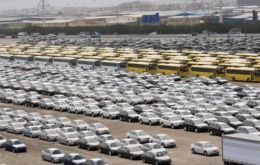
Brazilian auto sales rose 2.9% to a record 3.4 million units in 2011, compared with the previous year, the daily O Estado de S. Paulo reported Tuesday, quoting industry sources.
-
Saturday, November 12th 2011 - 12:45 UTC
Brazil eases capital requirements for some consumer loans
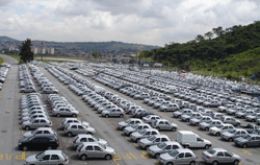
Brazil’s central bank cut capital requirements for some consumer loans with maturities of up to five years, including car loans, as it seeks to fine tune measures taken last year to prevent excessive risk in the financial system.
-
Friday, November 4th 2011 - 08:14 UTC
October car sales in Brazil drop 10% surprising dealers and the auto industry

Car sales in Brazil dropped 10% in October compared to the previous month according to the country’s dealers association, Fenabrave turning warning lights on for the global auto industry. This follows September’s decline that affected all of Brazilian industrial production.
